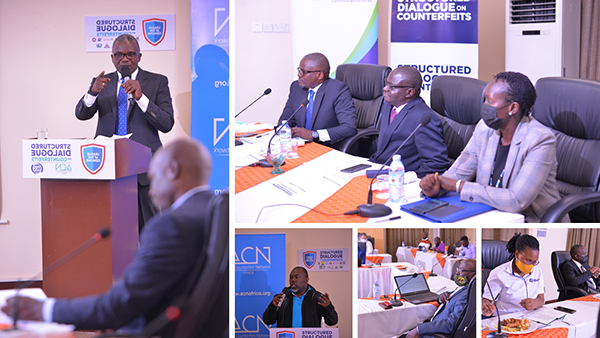As the first-ever high-level dialogue on counterfeit electronics got underway on Thursday, one message was consistent in the day’s key speeches: the need for inter-agency cooperation to tackle the problem.
The Permanent Secretary, Ministry ICT and National Guidance, Vincent Bagiire, led the call for a multi-sectoral approach, saying stakeholder cooperation will yield stronger adherence to standards, ease enforcement efforts and raise awareness about counterfeits.

“Suffice to say that in forums like today’s, I am hoping to see efforts towards co-operation amongst entities on trademark enforcement, for this is the foundation of combating counterfeits,” Mr Bagiire said, in a speech read for him by Julius Peter Torach, Commissioner, Information Technology.
Held at Protea Hotel in Kampala, the half-day dialogue was organised by the Anti-Counterfeit Network Africa (ACN), in partnership with Uganda Communications Commission (UCC).
In her opening remarks, UCC Ag. Executive Director Irene Kaggwa Sewankambo echoed the co-operation message, saying a successful fight against counterfeit electronics will take concerted efforts from all key stakeholders.

“It is on that note that I call upon stakeholders, regulators, policymakers, service providers, distributors, traders, civil society, research bodies and media to heed the call for collaboration on this subject,” she said. “It is my prayer that in this dialogue the topic of collaboration will get adequate attention.”
As the various speakers underlined the significance of working together, evidence of a strong coalition-building up against counterfeits could be reflected in the broad spectrum of attendance, with stakeholders as diverse as Uganda Revenue Authority (URA), Uganda National Bureau of Standards (UNBS), traders (KACITA), telecommunication companies, broadcasters and consumer bodies all represented.

Mr Fred Muwema, the ACN Director Legal and Corporate Affairs, made a passionate presentation on the dangers of counterfeits, warning that cases of cancer are on the rise, in part fueled by counterfeit electronics.
“We, the people, are not serious. Our standards are so low. We think we can’t afford a genuine product, we think it is expensive, but life is expensive,” he said, emphasizing that the struggle is not for the Government or UCC alone but everyone.
He too called for stakeholder co-operation, saying a participatory approach is the most effective way forward, as he applauded UCC for agreeing to partner with his organization, and calling on other Government agencies to emulate the communications regulator.

Asked to comment on the regulator’s roadmap to switch off counterfeit communications devices such as cellular phones, tablets and routers, the UCC Executive Director said the campaign had been suspended to allow for further engagement.
Solomon Oyebode Wilson, the chief counterfeit investigator with Clapper House Ltd, made chilling revelations about fake products in Uganda, pointing out that many items in major supermarkets are counterfeit.
The URA Manager Customs, Geoffrey Balamaga, spoke of how difficult it is to tell which products are genuine or fake, as well as the complexity of obtaining a conviction in court for offenders.
Everest Kayondo, the KACITA chairman, acknowledged that traders are often blamed for counterfeits in the market, but noted that it takes two to tango. If consumers stopped buying substandard or fake items, importers would have no reason to bring them in, he said.
At the end of what was clearly a productive day, it was evident that the first-ever high-level dialogue on counterfeit electronics had delivered on talking, and what is left now is to walk the talk.





